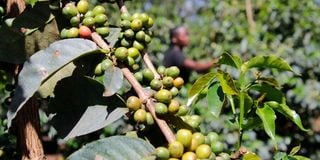Farmers receive highest coffee pay in Nyeri

A farmer tends to her coffee in Nyeri town on October 25, 2022. For 10 years, the Ndaroini Coffee Growers Association factory has been paying farmers affiliated with it Sh100/kilo and above for their coffee.
Farmers from Ndaroini Coffee Growers Association are smiling all the way to the bank after they were paid Sh100 per kilogramme of coffee they delivered to the factory last year.
With poor prices realized this year by most factories across the region, this will be the first to attain the Sh100 per kilo mark in the Central region with a Sh180 million bounty circulating within Mathira constituency.
For 10 years, the factory has been paying the 2, 000 farmers affiliated with it Sh100/kilo and above for their coffee.
The association’s chair Joseph Mukuha said he adheres to certain rules and regulations at the farm level with his farmers, the factory and the processing of the parchment and the marketing of the same.
“The millers and marketers cannot sell our coffee without my involvement… when I realize the prices are poor, I tell them not to sell. For instance, we did not sell any coffee to the Nairobi Coffee Exchange save for the lower grades because the prices were poor,” he said.
He went on to say that he also negotiates prices directly with buyers to secure a better deal for the farmers.
At the farm, he added, he ensures that farmers apply good agricultural practices through occasional follow-up from extension officers contracted by the factory.
“We ensure that the coffee plants are well taken care of and sprayed on time to ward off pests and diseases and scout for emerging trends in the coffee cycle in light of climate change as well as ensuring farm inputs are available to the farmers and are utilized at the right time,” he said.
While processing the coffee after pulping, Mr Mukuha said the staff is trained on how to handle the produce without missing a single step to avoid altering the quality.
“Drying has to meet the international standards which means all our coffee has to maintain 11.5 percent moisture content,” he said, adding that during the wet season, they complement the sun drying of parchment with solar dryers installed in the factory.
In addition, he has engaged three millers and marketers who bid on the factory’s coffee to different buyers overseas.
“Once they sell different quantities we add up and manage the high pay for our farmers. Eighty percent of our coffee is sold through the direct sale window which attracts higher prices for specialty coffee,” he stated.
Further, Mr Mukuha said that to ensure the high pay, the factory and the marketers have to agree on a minimum price they are willing to take after the sale of coffee.
The farmers produced 1.8 million kilos of coffee in comparison to 1.9 million kilos realised in the previous year due to a prolonged drought that affected the formation of berries.
During this year’s season, Mr Mukuha said he is projecting to produce about 2.5 million kilos against the backdrop of favorable weather that has supported flowering and berry formation. Some farmers are already picking the coffee.





